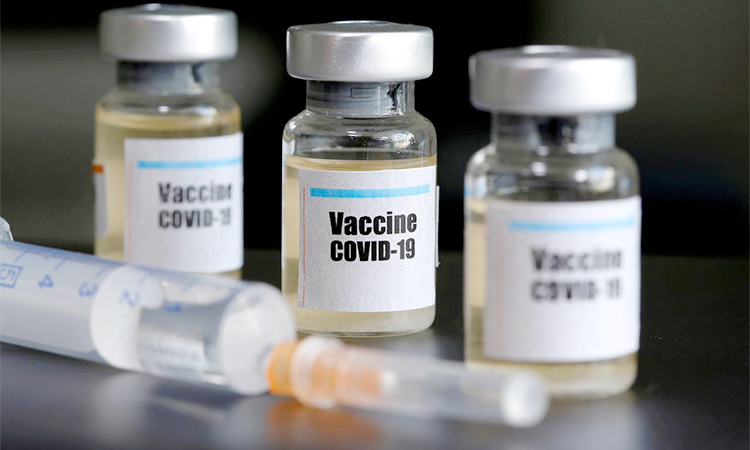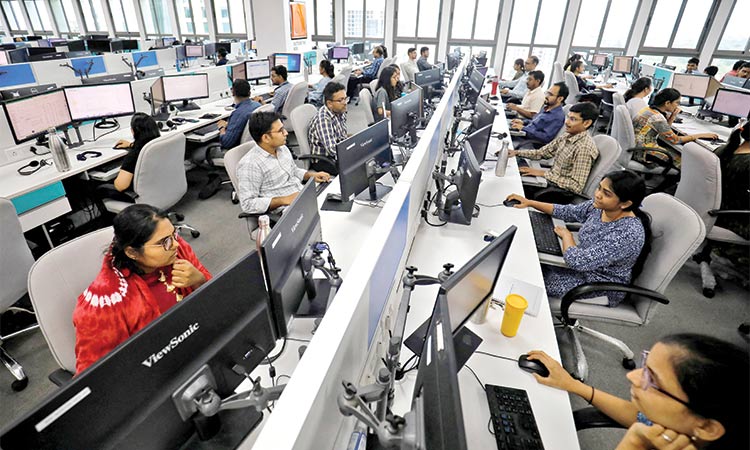Hospitals in US groaning under the weight of virus

A resident of a nursing home in Brooklyn, New York, receives the Pfizer-BioNTech Covid-19 vaccine at a local hospital. Reuters
Straining to handle the record number of COVID-19 patients, hundreds of the nation’s intensive care units are running out of supplies and competing to hire temporary travelling nurses at soaring rates. Many of the facilities are clustered in the South and West.
Space is another problem. Augusta University Medical Centre in Georgia is treating adult ICU patients, under age 30, in the children’s hospital. Recovery rooms now have ICU patients, and, if things get worse, other areas – operating rooms and endoscopy centres – will be the next areas converted for critical care.
An analysis shows that since November, the share of US hospitals nearing breaking point has doubled. More than 40 per cent of Americans now live in areas running out of ICU space, with only 15 per cent of beds still available.
The death tally from the coronavirus is a whopping 400,000, and this was the figure when Donald Trump ended his tenure as the President of the US. Trump has initially claimed the virus would “disappear”.
“It’s going to disappear. One day, it’s like a miracle, it will disappear,” Trump said early last year.
But America is still waiting for that “miracle”.
Trump left office with 24,255,934 coronavirus cases and 402,269 deaths, according to data from Johns Hopkins University. This death toll was nearly equal to how many American soldiers died during the Second World War, which stands at about 405,000.
The former president did not create the virus, but he has been long criticised for his lack of response to the global pandemic.
It was a grim Christmas for many Americans as hospitals were struggling to find beds for the sick and political leaders imposed restrictions to try to curb new infections.
In California, an epicentre of the latest surge, intensive care unit (ICU) beds were scarce and hospitals said they lacked enough doctors and nurses to care for patients.
Intensive care units are the final defence for the sickest of the sick, patients who are nearly suffocating or facing organ failure. Nurses who work in the most stressed ICUs, changing IV bags and monitoring patients on breathing machines, are exhausted.
There is an average of 20,000 new cases a day in Texas, which has the third-highest death count in the country and more than 13,000 people hospitalised with COVID-19-related symptoms.
In New Mexico, one surging hospital system brought in 300 temporary nurses from outside the state, at a cost of millions of dollars, to deal with overflowing ICU patients, who were treated in converted procedure rooms and surgery suites.
In Los Angeles, Cedars-Sinai Medical Centre ran into shortages of take-home oxygen tanks, which meant some patients who could otherwise go home were kept longer, taking up needed beds. But the biggest problem is competing with other hospitals for travelling nurses.
Houston Methodist Hospital recently paid $8,000 retention bonuses to keep staff nurses from signing up with agencies that would send them to other hot spots.
While the vaccines hold promise, hope still seems dim as ICU cases keep mounting. It’s unclear whether the easing will continue with more contagious versions of the virus arising and snags in the rollout of vaccines.
There seems to be no proverbial light at the end of the tunnel. And that is a worrying factor.







